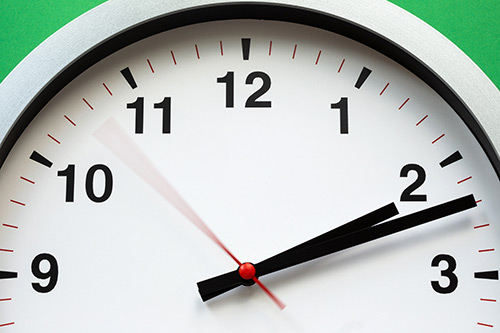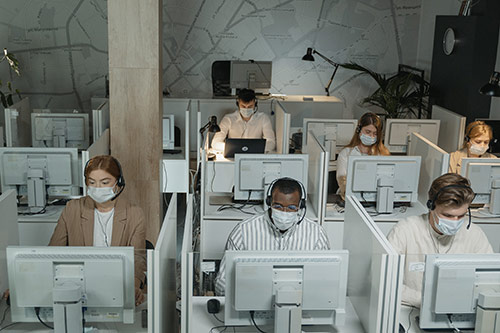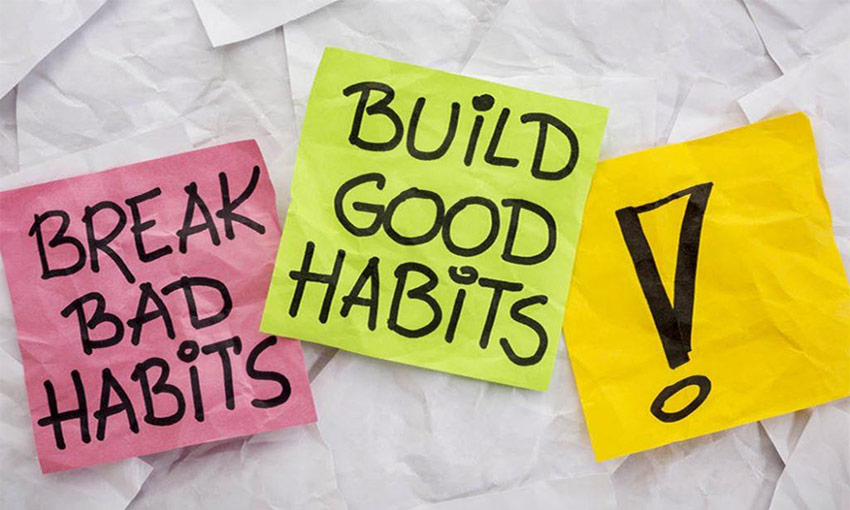
We partner with trusted companies that offer products which help our readers achieve their goals! If you purchase through our partner links, we get paid for the referral at no additional cost to you! Read our disclosure for more info.
“I hate work.”
“My job sucks.”
Sound familiar? There’s nothing worse than going to bed with the reality that you hate your job.
Then, you wake up. Now it’s time to get ready for work, and you want to leave your job so bad that it makes you sick. The good news? You don’t have to be stuck there.
The key is knowing when to quit your job.
It’s also important to know that you may be in the wrong career. You should first make a list of the pros and cons of your job, weigh them, and decide if you hate your job enough to leave.
That’s what this article is about—guiding you so that you can self-reflect on the right questions, in hopes of realizing what type of work you belong in, and to become aware of knowing when, and how to quit your job.
Here are 15 reasons why you might hate your job, and what to do about it:
1. You hate your job because you don’t like your co-workers
What’s worse than showing up to a job you hate? Being greeted at the door by co-workers who are uninspiring, or perhaps a manager who doesn’t like you.
Maybe the staff you work with is stuck up—too good to be your friend at work.
Perhaps they know your supervisor is going to choose you for the team lead promotion, and so, they despise you for it. Or they’re envious that your work is always so perfect, so they judge you as if your excellence is intended to make them look bad.
Not getting along with the people you work with can ruin your job experience. Sometimes, it’s enough of a reason to leave your job.
This is especially true when you have an inexperienced leader. An inexperienced manager can indirectly treat you poorly based on reasons such as:
- Your boss’ mistaking having a management degree as having experience.
- Your manager’s personality isn’t management material. Not everyone is meant to lead.
- Your boss allows their personal views of you to affect how they manage you. This could be in the form of ignoring your texts to hold power over you, micromanaging, and not considering your expertise in matters that relate to the job.
These are all things that can affect your performance at work, the enjoyment in your role, and even your mental health and energy levels.
What’s the takeaway?
If you are trying to figure out what to do when you hate your job, take a look at your co-workers and manager. Do you get along? If your workplace environment seems toxic beyond repair, it’s likely that you should quit your job.
2. When you don’t like your job because of your schedule/shift
Working third shift—aka the graveyard shift, can be rough. It can really make you hate your job.
Evolution has programmed our body and mind to wind down at night, and to spring back to action in the morning.
In fact, the American Phycological Association suggests that no matter how much sleep a night-worker gets during the day, it will never make up for the hormonal imbalances that occur due to circadian misalignment.
But, some people actually thrive on it. I know someone who has worked third shift for 30 years, and he absolutely loves it. I used to assume that he forced himself to like that schedule, but, as it turns out, he genuinely enjoys it.
For most, though, no one really chooses to work third shift. And if you have to do it, it can really make you hate your job.
What’s the takeaway?
Having a bad schedule can make you despise going to work. Other than mentioning your dissatisfaction to your boss, in addition to getting 8 hours of sleep per night, there’s not much you can do about it.
You can either ask for a different shift, or find a new job.
3. How to not hate your job by fitting into your role
Unless you’ve gotten lucky and found the perfect role in your company, chances are, some days, you hate being there. You’ve got to push hard to find motivation for work.
For instance, let’s say you get hired at the local convenience store as a cashier. You love it—you love feeling all that MONEY. Suddenly, the manager switches you to deli because she thinks you’re a better fit there.
But you HATE the deli. You HATE ham. And you hate taking orders from angry customers who yell at you because you forgot to dice their lettuce into 2-inch diagonals.
Or better yet, you get hired by an insurance firm to farm existing clients. A month later, your firm gets desperate and has you cold calling. But you absolutely hate it—you don’t like selling supplemental benefits to strangers.
You’re hating your new job.
The best thing you can do is reach out to management, be honest with them about how you are feeling, and work toward a solution, such as finding another role in the company.
What’s the takeaway?
If you’re wondering what to do if you hate your job and the role you are in, you have a few options: find a new role, work with management to alter your role’s job descriptions, or find a new job.
4. You hate your job because you get weird vibes
Have you ever started a new job, and the moment you walked in, you got weird vibes? The kind where you immediately feel like you don’t fit in, like a fish out of water.
It’s normal to feel this way when you start a new job, especially in an office environment. Being in close quarters with strangers can be awkward enough. And now, you’ve got to prove yourself to them. It’s intimidating.
The only way through this weird phase is to wait it out. Give it a week or two. Don’t spontaneously quit your job without a plan.
However, sometimes the feelings never go away. If that’s the case, it can really make you hate your job, and you might need to find a different one.
What’s the takeaway?
There are a few good reasons to leave your job, and working with people who weird you out is certainly one of them. If you feel uncomfortable at work, and you never seem to get ‘warmed up’ with them, it may be time to work elsewhere.
5. Environmental reasons to leave your job
Do you prefer to have a job where you are outdoors performing duties in the elements? Or are you more content sitting at a desk doing brain work?
There are also jobs that have a mixture of both (indoor and outdoor work), like being a taxi driver. You’re stuck within confined quarters for eight hours, but at the same time, you’re free as a bird to journey throughout the world.
No matter which type of environment you work in, you should consider developing organization techniques if you want to excel. Being in a suitable environment for your personality type and desires does make a big difference.
If you wondering how to know when it’s time to leave your job, you’ve got to ask these two questions:
- What do you want to DO for work?
- What environment do you want to work in?
Maybe you want to work with fish—it’s a hobby of yours. You love the feel of water on your hands, and enjoy feeding, breeding, and maintaining fish environments. If so, then working as, for instance, an office assistant, might not be the job for you.
You’ve got to work somewhere where you thrive the most; something that matches who you are and your interests.
What’s the takeaway?
Do you hate your job? If so, decide what kind of work you want to do, and in which elements you desire most. What makes you happier? Being indoors, outdoors, or a mixture of the two? Recognize what type of environment makes you most productive, and find a job with similar conditions.
6. How to quit your job gracefully when it compromises your health
Your health can be a huge factor in determining your quality of life at work. I’m a diabetic, so I need a job that will keep my heart healthy, but that will also satisfy what I want to do.
And what I want to do is to be active at work, but at the same time, have days where I’m not active at all. In other words, I prefer an independent lifestyle where I can choose the outcomes of my days.
Having this independence allows me to maximize my work goals, care for my diabetes, and pursue my passions.
Everyone has different needs in life, but caring for your health should be #1 on the list. You can’t care for your friends, family, kids, and pets if you’re sick, right?
Don’t allow your job to ruin your health, physically or mentally. This is especially true if you have anxiety symptoms. It’s important to find a balance that’s right for you.
What’s the takeaway?
There’s one important question to ask when you’re figuring out what to do when you hate your job: does it compromise your health? If the settings at your job don’t promote a lifestyle that will benefit your health, it would be wise to seek employment elsewhere.
7. Know when to quit your job due to income
There’s nothing worse than working at a job where you are giving your all, and taking home literally, nothing. It’s a bit demeaning if you think about it.
Considering some CEOs get paid millions of dollars per year. And then you’ve got Sue, the barista, making $9.15/hour.
Sure, Sue’s gossiping a lot (it’s a must in this role, right?) and sneaking free caramel fraps. Okay. If you consider the fraps, she’s making $9.20/hour. Still, Sue is doing her job. And it’s an important one—I mean, without her, there is no business.
So, what’s all this money-talk have to do with hating your job?
Because, deep down, you know there is something fundamentally wrong when Sue’s CEO is making $1050/hour. Not per week, per HOUR.
It would take Sue 114 hours to make what her CEO makes in 1 hour.
Sure, Sue gets it. Her CEO worked hard for her position. She likely has continued education, qualifications, experience, connections, etc.
But at what point should the divide of the bridge between human time, existential meaning, and the necessities of life be separated?
In Sue’s eyes, what matters most, is not what her boss is making, but that she can make enough to live a quality life.
So when income becomes an issue—which, according to 81% of Americans is an issue, it’s enough to make one despise their job, and leave the company.
What’s the takeaway?
If you’re wondering what to do when you hate your job, take a look at your income. Are you making enough money? If not, you have three options:
- Negotiate a salary you deserve.
- Accept the pay you’re getting.
- Find a new role or job.
8. When to know to quit your job as an introvert or extrovert
Some people prefer to be inside all day, away from others. This might mean you’re an introvert. You may do well at a desk job, or perhaps, a fortune cookie writer.
Sometimes when you’re an introvert, you can force yourself to play an extroverted role at your job, and vice versa.
For instance, I was a hardcore introvert growing up. Still, against all odds, I ended up buying a barbershop. I was 20 years old, and I actually loved doing it. I will say, however, that being introverted made it difficult some days.
I had to force myself to enjoy talking with customers. And I often wondered if I was talking too much, or not enough. I eventually tricked myself into believing that I loved being extroverted. And before I knew it, I did actually did love it.
The key to being introverted at work and not hating your job is acceptance.
If you can accept things for the way they are, then you can cope, and allow your personality to grow with your job. But if you can’t accept being in a role that requires you to come out of your shell, when you don’t want to, you should probably find a new job.
What’s the takeaway?
If you’re an introvert/extrovert and are trying to figure out what to do when you hate your job, the solution boils down to trial and error. You won’t know what you truly enjoy until you go through the process of elimination.
If you’re in a role you don’t like, eliminate it. Try a new role. Say this doesn’t work, then try another employer. And if that doesn’t work, try a different career path.
9. What if you hate your job due to having no impact
Do you feel like you’re making enough of an impact on the world in your current job? If not, don’t feel bad. A whopping 53% of Americans feel the same way. That’s over 85 million people in only the U.S.
So, what can you do about this? How can you feel like you’re impacting the world?
One good way to achieve this is to do work that correlates to your childhood dreams. These are the things which defined you in your younger years.
For instance, when you were young, did you enjoy looking up at space? If so, maybe space is a passion of yours. Did you ever consider a career that could help with space-related efforts, such as technology and exploration?
You might want to rethink learning day trading in the stock market, and instead, invest your time into pursuing your deeper passions, which, ultimately, will bring you happiness.
When is it time to quit your job?
Take a look at where you are in your career, in life, and reflect on it. Is this your big plan? To be doing what you are doing now? Sometimes we need to make changes, and that’s OK.
“You can never have an impact on society if you have not changed yourself.” – Nelson Mandela
What’s the takeaway?
Why do you want to leave your job? Focus hard on what you want to do in life, what you want the world to know you by, and begin making changes today to get there.
10. When you hate your job depression and boredom begins
Defining your happiness in life solely on your job is generally a bad idea. That is, unless, you live for your job and it’s the career of your dreams.
Most people, however, don’t have the job of their dreams. You’ve got to focus super hard to figure it out. It can be difficult, and it uses a lot of mental energy along the way.
That is, of course, if you’re actively searching for it. Regardless, sometimes life can get boring, and it can strain your ability to continue searching for answers.
This is especially true regarding your job. When we are bored at work, the boredom can be so intense that it becomes distracting. The boredom consumes you. It might be one reason why you want to quit your job.
What do you want to leave your job?
Is it boredom? Hatred of your manager? Fear of never making enough money? It’s likely at least one of these.
If it’s boredom, just bear with it now, and try to figure out why you’re so bored. Don’t be mistaken though; boredom is always going to happen—in every job, and every aspect of life.
You may love the beach, but trust me, living there is not all it’s worked up to be. I live at the beach. At first, it was a dream come true. And it is. But after awhile, it’s like tying shoes—it becomes routine—you expect it. And there’s no mystery in things you expect.
What’s the takeaway?
If you’re trying to figure out why you want to leave your job, perhaps it’s because you’re really bored. You need some mystery in your life.
11. What to do if you don’t like your job because you aren’t proud
Have you ever had a job where you hesitated to tell people what you do because it embarrassed you? You didn’t want them to misunderstand you—your reasons?
When you’re a teenager, it’s not so bad, because no one really has a career at that age. But, when you’re an adult, and you’re doing things that teenagers do for work, it can really make you question yourself, and have you asking questions like:
“What am I to do with my life?”
Perhaps you are ashamed of your job because you desperately needed money, so you found employment on the lower ends of the totem pole.
Whatever your reasons for being ashamed, I’m here to tell you: don’t be. People in high places didn’t start there. Unless, of course, they were born into royalty. For most though, you have to work at it.
When should you leave your job?
I’ve said this once; I’ll probably say it in the future; and I’ll say it now:
“This is just a phase to the next part of my life.”
Everything you do now is just a stepping stone to your next chapter. Let your intentions, your goals, and how you treat others define you; don’t be defined by how others treat you.
What’s the takeaway?
If you are embarrassed about your role at your current job, know that it is just a stepping stone to get to the next chapter in your life.
Unless you are hurting yourself or others around you, keep doing what you are doing. Know that progress is around the corner.
12. How to deal with hating your job when you feel dispensable
Have you ever worked for a big corporation and people joked around about how you could be replaced easily? Unfortunately, it’s true.
However, a good employer should always attempt to make you feel worthy. It’s pretty crummy when you shine at your job, and management gives off vibes as if you couldn’t possibly reach their level of success in the company.
I worked for a large privately owned company, years ago. I remember the first day of corporate training like it was yesterday. Do you know why I remember it so clearly?
Because us new hires sat at the oval, wooden table, it was a minute past our meeting time, and the first line that came from the training manager’s mouth was this:
“Glad most of you made it. As for the others who are late, well…they can find another company to work for.”
I kid you not; I was shocked. Listen, I get it, they’re strict on tardiness. But, wow. Really? Not only is it bad taste, but it made us—who attended, feel as if she would say the same about us. As if we were her objects, her tools.
Her personality was very lacking, and you could tell she had problems getting along with people, professionally and personally.
Her cruel words made us feel dispensable.
You’ll find this a lot in corporate environments. It can happen everywhere, though—in every sector of work, and in all sizes of business.
What’s the takeaway?
If you find that you hate your job, consider how you feel about the way you are treated there. Does management make you feel good about yourself?
If not, it’s best that you find an employer who cares about the happiness of their staff equally as the growth of the company.
13. Ugly work environment makes you hate your job
The nature of this section doesn’t really apply to working outdoors, because well, what’s unpleasant about being outside? Unless, of course, you live somewhere where it’s cold and the sun never shines. Even then, beauty can be found.
Let’s talk offices. There is nothing beautiful about a room of solid beige walls and gloomy lighting. Throw a few computers, phones, and cubicles into the mix, and you’re looking at misery.
Spending 8-10 hours in a room like that can really make you question your life. I mean, spending that amount of time in even the most pleasant of rooms can make you feel trapped. You’d better know the importance of laughter if this is you.
The best thing you can do is to reach out to management and make a suggestion, or two. Maybe put up some posters, paint the walls different colors, or even add in a few plants.
In fact, it’s highly recommended to incorporate plants into your work environment.
A few benefits of adding plants in the office are:
- Plants clean the air
- They improve creativity and productivity
- Plants reduce stress and noise levels
What’s the takeaway?
Sometimes our work environment can be so dull, that it makes us not want to be there. So, what do you do if you hate your job because your atmosphere is boring and uninspiring? You spruce things up.
I’m not saying quit your job because you’re not surrounded by flowers. But, if you want to be with your employer long-term, make it easier on yourself and give life to your surroundings.
14. What do you do when you hate your job and feel unappreciated
Feeling unappreciated at work kind of goes in-hand with feeling dispensable and used.
Even though an employer may make you feel dispensable, they can still appreciate your work. This includes things like giving you raises, bonus incentives, etc.
They may not ‘thank’ you much, but at least you have growth in the company.
The issue arises when you are not growing in the company AND you’re not being appreciated.
Say, you’ve been working with your company for a while. You look back, and realize your manager has never actually said thank you, or good job, or anything.
Perhaps your manager goes to eat lunch with the owner of the company, every day, but has never taken that time to eat with his team. These are signs of a bad manager.
A good employer will mingle with the team, be one with the team, and appreciate the team.
Don’t let a company fool you into believing that you should be lucky to work there. If you are excelling in your role, they should show you that they are grateful to have a worker like you.
What’s the takeaway?
Sometimes we hate our jobs because we feel unappreciated. If this is your case, and it really bothers you, it might be best to find another employer. Teaching people how to be appreciative is not really worth your time, nor is it your job.
15. You hate your job because you’re in the wrong career
I’ve been waiting patiently to get to this section. It’s the topping on the cake, and the last step before deciding to quit your job.
Let’s say you’ve read this entire guide, but you still can’t decide why exactly you hate your job. What could be the missing key? Why can’t you find happiness in the place you’re spending most of your day?
Well, it’s very possible you are in the wrong line of work. You have chosen the wrong career path. But wow could this be?
Perhaps you are having trouble finding your passion in life, and so, naturally, you would also pick the wrong career.
You hate your job, and haven’t found your passion. What’s next?
If you have read through sections 1-14, feel they don’t apply to you, and still can’t shake the urge to step away from your job, then there are a few more steps to review. Seven of them, to be specific.
You can read about them here: 7 signs it’s time for you to change careers.
What’s the takeaway?
Sometimes you may search for answers as to why you hate your job so much, when the truest reason is the most obvious: you belong in a different line of work.
Birds are born to fly. They can walk, too. But they will always be born to fly.
Conclusion
Life is what you make of it. Don’t expect happiness to organically happen at your job, if you aren’t setting up the proper conditions to allow happiness to flourish.
You can’t always predict the outcomes of the world around you. But what you can predict, and control—mostly, is working somewhere that won’t make you feel like you hate your job. Follow the steps in this guide, and you will be one step closer to your career goals.
That’s it, my friends. Good luck.
Here’s a quick recap of 15 Reasons Why You Hate your job:
- Don’t like your co-workers.
- Bad schedule/shift
- Don’t fit in your role.
- You get weird vibes.
- You prefer indoor or outdoor work.
- It compromises your health.
- You’re not making enough money.
- You’re an introvert or extrovert.
- You aren’t making enough of an impact.
- Bored or outgrew the job.
- You aren’t proud of what you do.
- You feel dispensable and used.
- Ugly work environment.
- You feel unappreciated.
- You’re in the wrong career.
That’s all folks! Thanks for reading.
Feel free to comment below if you liked this article on 15 reasons why you hate your job. I’d love to take questions or suggestions on other content you’d like to see on eHowdy!
Share Post ❤️
Aaron McCloud


Most Popular

Should You Follow Your Childhood Dreams?

Is Sleeping 6 Hours Enough? (5 Reasons It’s Not)

10 Unique Reasons You are Misunderstood [How To Prevent It]


















